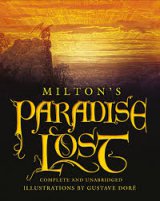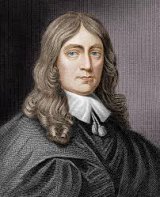Paradise Lost Page #12
Paradise Lost is an epic poem in blank verse by the 17th-century English poet John Milton. The first version, published in 1667, consisted of ten books with over ten thousand lines of verse. A second edition followed in 1674, arranged into twelve books with minor revisions throughout and a note on the versification.
Thus Satan; and him thus the Anarch old With faultring speech and visage incompos’d Answer’d. I know thee, stranger, who thou art, That mighty leading Angel, who of late Made head against Heav’ns King, though overthrown. I saw and heard, for such a numerous host Fled not in silence through the frighted deep With ruin upon ruin, rout on rout, Confusion worse confounded; and Heav’n Gates Pourd out by millions her victorious Bands Pursuing. I upon my Frontieres here Keep residence; if all I can will serve, That little which is left so to defend Encroacht on still through our intestine broiles Weakning the Scepter of old Night: first Hell Your dungeon stretching far and wide beneath; Now lately Heaven and Earth, another World Hung ore my Realm, link’d in a golden Chain To that side Heav’n from whence your Legions fell: If that way be your walk, you have not farr; So much the neerer danger; goe and speed; Havock and spoil and ruin are my gain. He ceas’d; and Satan staid not to reply, But glad that now his Sea should find a shore, With fresh alacritie and force renew’d Springs upward like a Pyramid of fire Into the wilde expanse, and through the shock Of fighting Elements, on all sides round Environ’d wins his way; harder beset And more endanger’d, then when Argo pass’d Through Bosporus betwixt the justling Rocks: Or when Ulysses on the Larbord shunnd Charybdis, and by th’ other whirlpool steard. So he with difficulty and labour hard Mov’d on, with difficulty and labour hee; But hee once past, soon after when man fell, Strange alteration! Sin and Death amain Following his track, such was the will of Heav’n, Pav’d after him a broad and beat’n way Over the dark Abyss, whose boiling Gulf Tamely endur’d a Bridge of wondrous length From Hell continu’d reaching th’ utmost Orbe Of this frail World; by which the Spirits perverse With easie intercourse pass to and fro To tempt or punish mortals, except whom God and good Angels guard by special grace. But now at last the sacred influence Of light appears, and from the walls of Heav’n Shoots farr into the bosom of dim Night A glimmering dawn; here Nature first begins Her fardest verge, and Chaos to retire As from her outmost works a brok’n foe With tumult less and with less hostile din, That Satan with less toil, and now with ease Wafts on the calmer wave by dubious light And like a weather-beaten Vessel holds Gladly the Port, though Shrouds and Tackle torn; Or in the emptier waste, resembling Air, Weighs his spread wings, at leasure to behold Farr off th’ Empyreal Heav’n, extended wide In circuit, undetermind square or round, With Opal Towrs and Battlements adorn’d Of living Saphire, once his native Seat; And fast by hanging in a golden Chain This pendant world, in bigness as a Starr Of smallest Magnitude close by the Moon. Thither full fraught with mischievous revenge, Accurst, and in a cursed hour he hies. THE END OF THE SECOND BOOK. PARADISE LOST BOOK III. Hail holy light, ofspring of Heav’n first-born, Or of th’ Eternal Coeternal beam May I express thee unblam’d? since God is light, And never but in unapproached light Dwelt from Eternitie, dwelt then in thee, Bright effluence of bright essence increate. Or hear’st thou rather pure Ethereal stream, Whose Fountain who shall tell? before the Sun, Before the Heavens thou wert, and at the voice Of God, as with a Mantle didst invest The rising world of waters dark and deep, Won from the void and formless infinite. Thee I re-visit now with bolder wing, Escap’t the Stygian Pool, though long detain’d In that obscure sojourn, while in my flight Through utter and through middle darkness borne With other notes then to th’ Orphean Lyre I sung of Chaos and Eternal Night, Taught by the heav’nly Muse to venture down The dark descent, and up to reascend, Though hard and rare: thee I revisit safe, And feel thy sovran vital Lamp; but thou Revisit’st not these eyes, that rowle in vain To find thy piercing ray, and find no dawn; So thick a drop serene hath quencht thir Orbs, Or dim suffusion veild. Yet not the more Cease I to wander where the Muses haunt Cleer Spring, or shadie Grove, or Sunnie Hill, Smit with the love of sacred song; but chief Thee Sion and the flowrie Brooks beneath That wash thy hallowd feet, and warbling flow, Nightly I visit: nor somtimes forget Those other two equal’d with me in Fate, So were I equal’d with them in renown, Blind Thamyris and blind Maeonides, And Tiresias and Phineus Prophets old. Then feed on thoughts, that voluntarie move Harmonious numbers; as the wakeful Bird Sings darkling, and in shadiest Covert hid Tunes her nocturnal Note. Thus with the Year Seasons return, but not to me returns Day, or the sweet approach of Ev’n or Morn, Or sight of vernal bloom, or Summers Rose, Or flocks, or herds, or human face divine; But cloud in stead, and ever-during dark Surrounds me, from the chearful waies of men Cut off, and for the book of knowledg fair Presented with a Universal blanc Of Natures works to mee expung’d and ras’d, And wisdome at one entrance quite shut out. So much the rather thou Celestial light Shine inward, and the mind through all her powers Irradiate, there plant eyes, all mist from thence Purge and disperse, that I may see and tell Of things invisible to mortal sight. Now had the Almighty Father from above, From the pure Empyrean where he sits High Thron’d above all highth, bent down his eye, His own works and their works at once to view: About him all the Sanctities of Heaven Stood thick as Starrs, and from his sight receiv’d Beatitude past utterance; on his right The radiant image of his Glory sat, His onely Son; On Earth he first beheld Our two first Parents, yet the onely two Of mankind, in the happie Garden plac’t, Reaping immortal fruits of joy and love, Uninterrupted joy, unrivald love In blissful solitude; he then survey’d Hell and the Gulf between, and Satan there Coasting the wall of Heav’n on this side Night In the dun Air sublime, and ready now To stoop with wearied wings, and willing feet On the bare outside of this World, that seem’d Firm land imbosom’d without Firmament, Uncertain which, in Ocean or in Air. Him God beholding from his prospect high, Wherein past, present, future he beholds, Thus to his onely Son foreseeing spake. Onely begotten Son, seest thou what rage Transports our adversarie, whom no bounds Prescrib’d, no barrs of Hell, nor all the chains Heapt on him there, nor yet the main Abyss Wide interrupt can hold; so bent he seems On desperat revenge, that shall redound Upon his own rebellious head. And now Through all restraint broke loose he wings his way Not farr off Heav’n, in the Precincts of light, Directly towards the new created World, And Man there plac’t, with purpose to assay If him by force he can destroy, or worse, By som false guile pervert; and shall pervert; For man will heark’n to his glozing lyes, And easily transgress the sole Command, Sole pledge of his obedience: So will fall Hee and his faithless Progenie: whose fault? Whose but his own? ingrate, he had of mee All he could have; I made him just and right, Sufficient to have stood, though free to fall. Such I created all th’ Ethereal Powers And Spirits, both them who stood & them who faild; Freely they stood who stood, and fell who fell. Not free, what proof could they have givn sincere Of true allegiance, constant Faith or Love, Where onely what they needs must do, appeard, Not what they would? what praise could they receive? What pleasure I from such obedience paid, When Will and Reason (Reason also is choice) Useless and vain, of freedom both despoild, Made passive both, had servd necessitie, Not mee. They therefore as to right belongd, So were created, nor can justly accuse Thir maker, or thir making, or thir Fate; As if Predestination over-rul’d Thir will, dispos’d by absolute Decree Or high foreknowledge; they themselves decreed Thir own revolt, not I: if I foreknew, Foreknowledge had no influence on their fault, Which had no less prov’d certain unforeknown. So without least impulse or shadow of Fate, Or aught by me immutablie foreseen, They trespass, Authors to themselves in all Both what they judge and what they choose; for so I formd them free, and free they must remain, Till they enthrall themselves: I else must change Thir nature, and revoke the high Decree Unchangeable, Eternal, which ordain’d Thir freedom, they themselves ordain’d thir fall. The first sort by thir own suggestion fell, Self-tempted, self-deprav’d: Man falls deceiv’d By the other first: Man therefore shall find grace, The other none: in Mercy and Justice both, Through Heav’n and Earth, so shall my glorie excel, But Mercy first and last shall brightest shine.
Translation
Translate and read this book in other languages:
Select another language:
- - Select -
- 简体中文 (Chinese - Simplified)
- 繁體中文 (Chinese - Traditional)
- Español (Spanish)
- Esperanto (Esperanto)
- 日本語 (Japanese)
- Português (Portuguese)
- Deutsch (German)
- العربية (Arabic)
- Français (French)
- Русский (Russian)
- ಕನ್ನಡ (Kannada)
- 한국어 (Korean)
- עברית (Hebrew)
- Gaeilge (Irish)
- Українська (Ukrainian)
- اردو (Urdu)
- Magyar (Hungarian)
- मानक हिन्दी (Hindi)
- Indonesia (Indonesian)
- Italiano (Italian)
- தமிழ் (Tamil)
- Türkçe (Turkish)
- తెలుగు (Telugu)
- ภาษาไทย (Thai)
- Tiếng Việt (Vietnamese)
- Čeština (Czech)
- Polski (Polish)
- Bahasa Indonesia (Indonesian)
- Românește (Romanian)
- Nederlands (Dutch)
- Ελληνικά (Greek)
- Latinum (Latin)
- Svenska (Swedish)
- Dansk (Danish)
- Suomi (Finnish)
- فارسی (Persian)
- ייִדיש (Yiddish)
- հայերեն (Armenian)
- Norsk (Norwegian)
- English (English)
Citation
Use the citation below to add this book to your bibliography:
Style:MLAChicagoAPA
"Paradise Lost Books." Literature.com. STANDS4 LLC, 2024. Web. 23 Nov. 2024. <https://www.literature.com/book/paradise_lost_101>.




Discuss this Paradise Lost book with the community:
Report Comment
We're doing our best to make sure our content is useful, accurate and safe.
If by any chance you spot an inappropriate comment while navigating through our website please use this form to let us know, and we'll take care of it shortly.
Attachment
You need to be logged in to favorite.
Log In